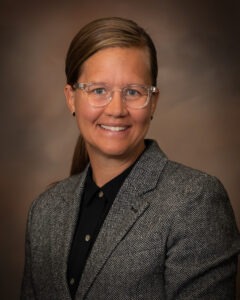
By Maria Archibald, Sustainability Office
Salt Lake City is famous for its winter inversions, which often cause residents to hunker down indoors, turn on their air filters, and avoid the dark cloud of smog hanging above the city. As climate change intensifies, residual wildfire smoke often makes summer air unsafe to breathe, too.
On Tuesday, Jan. 18 from 4-5 p.m., Dr. Heather Holmes, Associate Professor in chemical engineering, will give a GCSC seminar called “Wildfire Smoke and Air Quality in the Western U.S.,” which will address fire-related air pollution and her research in atmospheric physics.
engineering, will give a GCSC seminar called “Wildfire Smoke and Air Quality in the Western U.S.,” which will address fire-related air pollution and her research in atmospheric physics.
“I study the chemistry and the physics of the atmosphere,” says Holmes, whose lab uses ground-based sensors, atmospheric models, and satellite remote sensing to identify and investigate pollution sources. “A lot of the work I do is aimed at trying to better understand the different sources of air pollution in a given area,” she explains. “That helps policy makers put into place programs where you can then…decrease that pollution.”
Holmes comes from a mechanical engineering background and studied fluid mechanics in graduate school. “Air is a fluid,” she says. “And that crosses over then a lot with meteorology.” Holmes began studying weather patterns on the city and state scale, and became passionate about air quality after completing her PhD at the University of Utah and experiencing Salt Lake’s winter inversion. “I was really motivated to understand the pollution problems, and then really wanted to understand how the pollution impacts human health,” says Holmes.
In her talk, Holmes will discuss the consequences of wildfire in the western United States and the interdisciplinary collaboration between climate scientists, hydrologists, atmospheric scientists, air pollution specialists, and other scholars to address these issues. Her talk will give listeners “an understanding of why it’s difficult to simulate fire and smoke pollution in the western US and things we’re doing to try and fix that.”
To learn more from Holmes about some of the most pressing ecological issues facing Salt Lake City and the western US, tune in on Tuesday, Jan. 18 from 4-5 p.m. for the first GCSC seminar of the semester.
